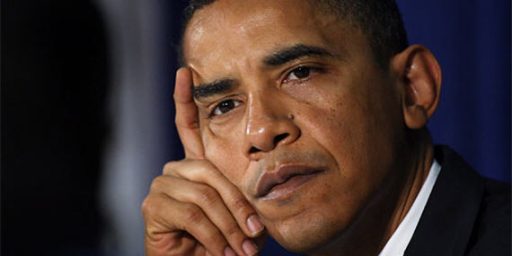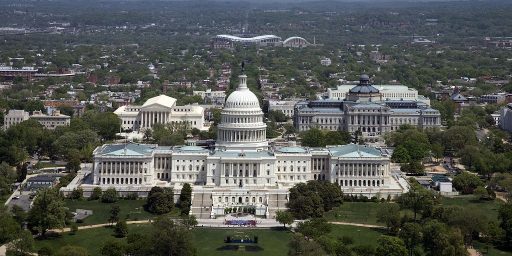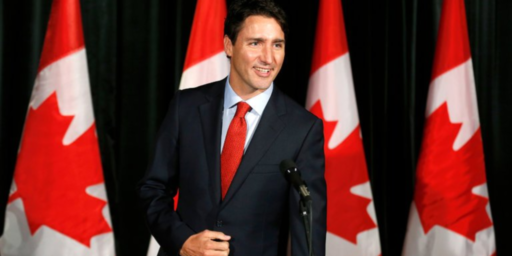America Red and Blue — or Purple?
While there are signs that the Red-Blue divide from last year’s election is softening, America is, in the words of one observer, “A nation of scorekeepers.”
Is America Still Red Vs. Blue, or Purpler? (AP)
If you want signs of hope, you can read about the hundreds of millions of dollars that poured in for relief after a nation watched, united in its horror, as a humanitarian nightmare took hold in New Orleans after Hurricane Katrina. You can remember the nomination of John Roberts for chief justice, which sailed through the Senate.
And if you want reasons to despair, you can flick on your computer and read the blogs, where conservatives accuse liberals of being unhinged “moonbats,” and liberals fire back that the right is a collection of “wingnuts.” Or you can reflect on the immediate partisan warfare that broke out over President Bush’s nomination of Samuel Alito to the Supreme Court.
Ask political experts around the country about the state of American discourse. You could ask 20 of them, actually, and come back with 20 different answers. Put another way: The nation is divided over whether it’s still divided.
“I think there has been a calming down,” says Morris Fiorina, a Stanford University political scientist. “Maybe it’s wishful thinking, but I see signs here and there that people are just getting tired of it.” He points to the Gang of 14, the bipartisan group of senators who headed off an historic battle over the threat of Democratic filibusters to stop President Bush’s appeals court nominees.
[…]
But ask Guy Burgess, who leads the Conflict Research Consortium at the University of Colorado, and he will paint a bleaker picture. He believes, to his disappointment, that we are still a nation of scorekeepers: Two points for the Bush administration if the day goes well in Iraq, two points for the war opposition if the body count pushes higher. To Burgess, this is still a nation of dueling political slogans rather than of real, substantive discussion. “I’m not sure that it’s gotten any better,” he says. “It may be a little more polite and a little less focused than before the election. But that’s just because the election was an immediate power contest that tends to bring out this kind of thing.”
[…]
Zizi Papacharissi of Temple University, who has studied civility — or the lack of it — in online political groups, believes some of the polarization arises from the extraordinarily large number of traumatic events the nation has lived through in just the past several years. She lists them: Impeachment, the Sept. 11 attacks, wars in Afghanistan and Iraq, a seemingly countless string of deadly hurricanes. Not to mention two very different presidential administrations. “I would be even more likely to use the word cynicism,” she says. “It has to do with the fact that it’s a public that’s very seasoned. So there’s skepticism, cynicism, disillusionment.”
Add to that the incredibly close election of 2000 and the bitter aftermath of the recount and court battles that followed.
The “nation of scorekeepers” line is pithy and accurately describes the scenario. It seems that we’re less polarized over the issues as rooting for our teams. While and ever increasing number of people claim to vote for “the man, not the party,” the reality is different. In the age of 24/7/365 cable news, talk radio, and blogs there is, to use a sports analogy, no offseason anymore.
While partisans in Congress always had an eye to the next election, presidents traditionally enjoyed a “honeymoon” after getting elected and was given the presumption that he had been given a “mandate” by the people. That hasn’t happened since 1992 or, arguably, 1988. Many Republicans considered Bill Clinton’s election somehow illegitimate because of various issues surrounding his character and they seized on issues like gays in the military and the so-called Travelgate non-scandal to bloody him soon after he took office. Certainly, he got no honeymoon after his 1996 re-election and, goodness knows, George W. Bush got none after the 2000 and 2004 elections.
The only real hope for getting out of this cycle is either a long, unifying event such as a popular war–a cure worse than the disease–or a Ronald Reagan or Dwight Eisenhower type president who is so amiable that his popularity crosses party lines. I don’t see one of those on the horizon. Ironically, Bush was thought to be precisely that when he was recruited in the late 1990s.






‘You can remember the nomination of John Roberts for chief justice, which sailed through the Senate.’
Sailed through? That there were 22 nays is a travesty.
In the event that the US changes to Blue, then, like in France, every American will eventually see the same thing happen here.
The Dems are just like the French. Just look at Kerry. If he had won, French would now be tought in every classroom